I began to wonder, “How bad can this get?” In reality, pretty bad. A larger than expected rainstorm dumped about “7.1 trillion gallons of water or enough to fill Lake Pontchartrain about four times. Hurrican Katrina, by comparison, dumped about 2.3 trillion gallons of rainwater in the state (https://en.wikipedia.org/wiki/2016_Louisiana_floods).
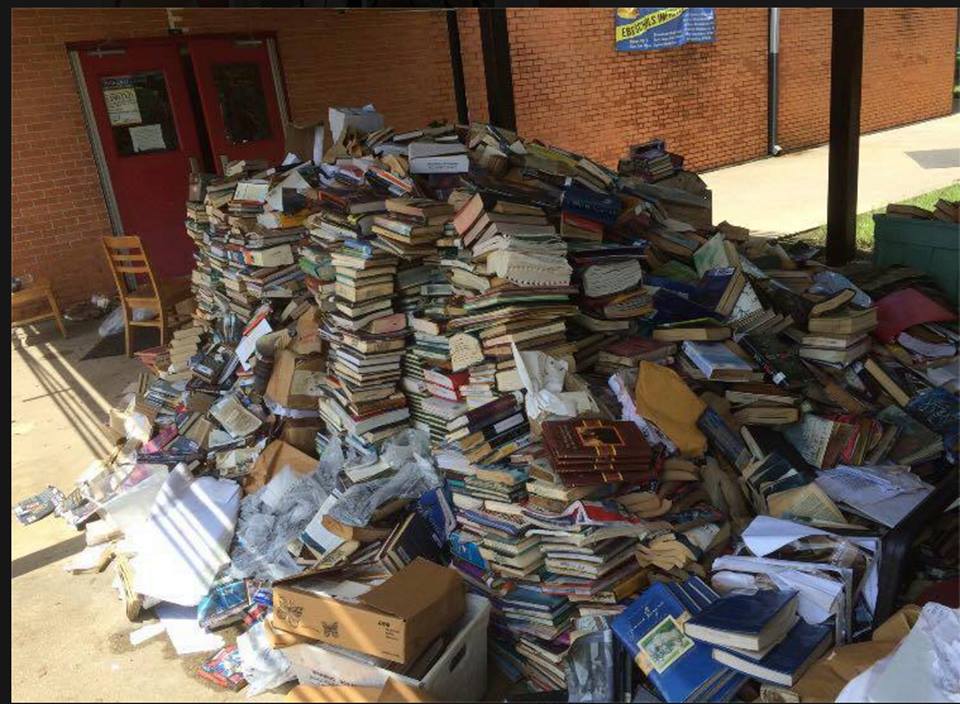
In this blog, I will try to recount how I began to think about one small part of this disaster—What is it like for a teacher to lose books?
One of the students, Sarah Batty, from my first year as an English Educator at Louisiana State University posted a picture that pushed it to the personal. She lost a annotated copy of To Kill a Mockingbird that had been passed down through three generations of teachers.
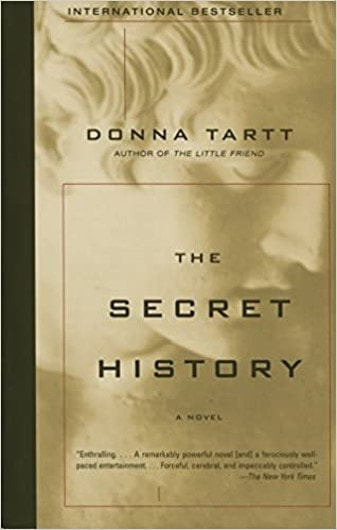
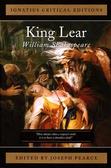
A few books that standout are: Pudd’nhead Wilson, Cane, Their Eyes Were Watching God, The Collected Works of Gerard Manley Hopkins, Cry, the Beloved Country, Moby Dick, The Sound and the Fury, One Day in the Life of Ivan Denisovich, Little Dorrit, Bleak House, Theodore Roethke’s Straw for the Fire, The Power and the Glory, I am the Cheese, Crime and Punishment, and Wide Sargasso Sea. Each book holds special memory of my own learning or teaching experience. Both my thinking and my teaching expanded as I thought deeply about these texts and worked through them with my students.
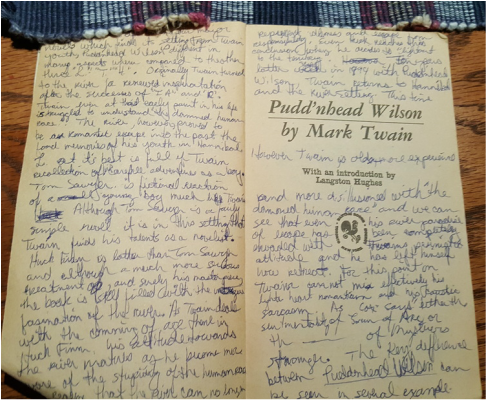 I hope no one spends to long try to decipher any of this. Just be glad that most of student write on computers with spell check.
I hope no one spends to long try to decipher any of this. Just be glad that most of student write on computers with spell check. As senior college student, I took a graduate seminar on Mark Twain from Dr. Richard Cracroft at BYU. His class was one of the most experiences as an English major. I began to think that maybe, just maybe, I could have original ideas about a piece of literature. While reading Pudd'nhead Wilson, I had an idea for paper. In reality, I struggled to write--still do--critically about literature. (This isn't just me being modest, there are still many of my extended family members and colleagues who can verify this account.) I didn't spell well and my hand writing was horrible. We had to type papers back then on a typewriter. Do some of you need a picture of one of these beasts? Sitting in the library, I had an idea while reading the book. I was unprepared for big ideas, no paper, no notebook, just a pen. I began writing what became, after several hand written version, a 20 page paper. I turned it in to Dr. Cracroft, who was a notable Twain scholar and received a good grade. It wasn't perfect, but it let me know that I could do the work; that I could read through a text and put together ideas. i taught the book a couple of times instead of Huck Finn and it was always on my shelf. When I need a boost of confidence, it was always there and still is. If it were gone, I would surely miss it.
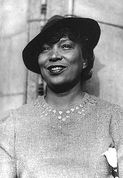
Both of these books weren't on my radar until a teacher discussed them with me. I never actually took a class from Steven Walker while I was at BYU, but he was always extremely generous with students. Some how I found out he had done work on Cry the Beloved Country and I became interested. The book was amazing and became one of the staples in my Sophomore Curriculum during the 1980's. My students generally knew next to nothing about South Africa or Apartheid. We did cross-curriculum work before I knew what to call it. My students read articles about Nelson Mandela, the African National Congress, The Boar War, Diamond Mining, and Ghandi, all before de Klerk began discussing negotiations in 1990. Some of my best teaching experiences occurred in those classes where we learned together about the racist practices in South African and how they might inform events and practices in the U.S. during the 1980s. During that period there were protests on college campuses about how their university endowments were invested in South America. In 1985, we listened to Sun City recorded by Artist United Against Apartheid.
I first saw the title of Their Eyes Were Watching God on the list of options for the open question on the Advanced Placement Literature exam. The following summer, I was at a NEH Summer Seminar at Auburn University and several of us began talking about which books we were using. One of the attendees highly recommended Zora Neale Hurston's wonderful book. I continued to teach this book every year in my AP course until I left to do graduate work. My eyes were opened and I tried hard to make this book part of every students' consciousness.
If either one of these books disappeared from my shelves I would be distraught. They represent moments when I began to think differently and my teaching changed.
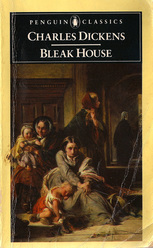
For many years, I taught a Dickens' novel in a serial format. Every other Tuesday was Dickens' day. As a kid, I struggled with long 19th century novels. They were too long, too slow, too something. I struggled the first time I had to teach A Tale of Two Cities; furthermore, I am sure that my students struggled. I wasn't as committed as I should have been. I had a hard time sharing Dickens' greatness, because I didn't quite get it myself. While reading through an English Journal I saw an application for NEH Summer Seminar about reading and teaching serialized Victorian novels directed by Dr. Michael Lund at Longwood College.
The experience change my teaching life. I taught a new Victorian novel every year for about 15 years, generally one I had never read before. Yes, and students do read long books if we read with them. One week I would quiz them and two weeks later they would quiz me. This practice lead to a sabbatical funded by the National Endowment for the Humanities and Readers Digest. Every year nearly a third of my students wrote on the current Dickens' novel on the AP Literature exam. (How do you not know a book well that you have lived with for nine months?) I point to Bleak House because, not only is it fantastic, but I taught the novel the year my oldest daughter was a student in my AP class. The book sits on my shelf as a reminder of this wonder pedagogical practice that changed my relationship with my students, Reading and discovering a novel with them throughout a school year was both challenging and rejuvenating. Many of them were better readers and writers than I was, I only kept them at bay due to my experience and the craftiness of old age. Having my daughter in the class added to the experience in immeasurable ways and Bleak House remains on the shelf as a marker. I don't think I could make it any clearer that losing this book would be like misplacing 15 years of teaching memories.
I am quite sure that teachers like Sarah are making memories with books. So, what can I do? I get more than my share of books. I belong to ALAN and I attend the annual Workshop, I preview books in my role as an academic and scholar of young adult literature. I try to promote and discuss the scholarship, teaching, and advocacy of this literature in this blog, during conferences, school visits, and in my courses. I read as many as I can and when I am done I pass them on to teachers, students, and other academics. I immediately realized I could help Sarah. When she is ready and has settled into her classroom, I can send her several boxes of books. She can shelf the books that are appropriate for her students and pass the rest on to her colleagues.
I know that the local school districts will take donations, but I always worry about how that will trickle down to books on teachers’ shelves. Will they be given money for books that students might choose to read? Unfortunately, I see institutions replacing books with anthologies, scripted curricula, and other mind numbing texts instead of novels and books for classrooms and libraries. By giving some books to Sarah, I know there is a good chance that a kid will wander over to her bookcase and take a book home that might interest them and lead them to new horizons. At our house, we feel compelled to help. We will give generically to our church and directly to LSU colleagues who have lost their homes, but a box of books to a teacher when they are ready for them would mean a great deal to me if I were in her place. Below is a closer look at what Sarah found when she visited her classroom.
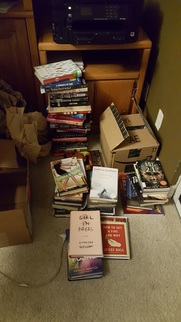 These are some of the books that are being set aside.
These are some of the books that are being set aside. I hope that others want to help. Last week in the blog, I mentioned that I would be helping in a small way. I also offered to keep a list of people who would like to help and then, when the time is right, match them with one of my former students, their colleagues, or their schools.
Of course, you can help anyway you would like. I am going to suggest a couple. 1.) Start collecting books that you have on your shelves and storing books that you can ship. I might even suggest you find a partner who might not have books, but you might be able to help you with shipping costs. 2. Maybe students in your YA literature classes might want to do a joint venture. Remember, this doesn’t have to be done this week or within the next month. The inhabitants of the area will be cleaning homes and schools for quite a few weeks. 3.) If you are in a school that does a charity drive during the holidays, you might consider encouraging them to sponsor a school in one of devastated districts. You could raise the money and sent up an amazon account with each English teacher in the school. They could then buy gently used books that are appropriate for their students. I am not sure how this would work; but, again, we have time. 4.) A group of teachers could collectively visit thrift stores and buy up gentle used YA books and other titles. Then, when they are ready you can send them the books. 5.) If you are an author and have a classroom set of books you can share them with some of these teachers. Those teachers can share the books and create groups of books that students can use in literature circle assignments.
There are probably several others ways we can help individual teachers restock their classroom libraries. I will continue to build the list of people who would like to donate books and prepare to match them we teachers in need.
Please take some time to listen to the news or read some evaluations about the level of loss. The people of Baton Rouge and the rest of southern Louisiana are great folks. It won’t take you long to see how engaged they are in helping each other clear out debris, cut out sheet rock, dry out the support lumber, and prepare to rebuild. Nothing I can do here will do justice to the pain or the loss. I can, however, help one teacher. I can help other individuals connect with a teacher. Hopefully, I can be helpful in connecting larger efforts. Thanks for listening.
Please take a moment to like this post on Facebook. It is also helpful if you share the post on Facebook or mention it on twitter. (I know that many of you have much larger networks than I do, so thank you in advance.)
Next week, we will be back to talking about developing a syllabus and preparing to share and teach this wonderful literature.

 RSS Feed
RSS Feed